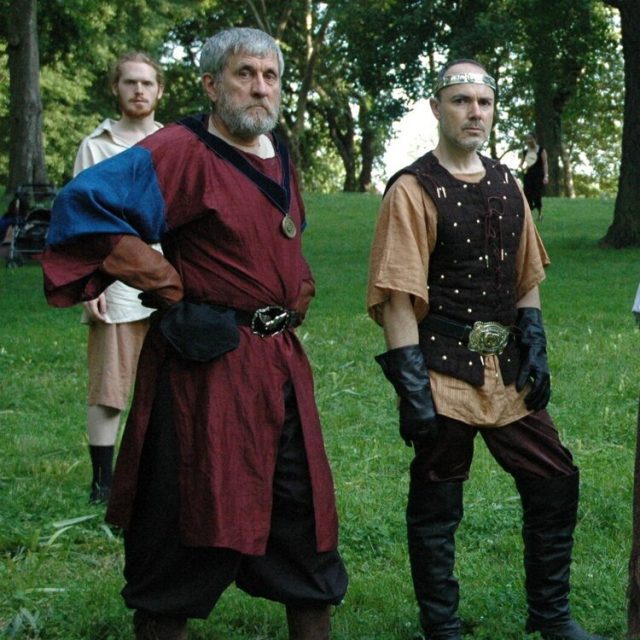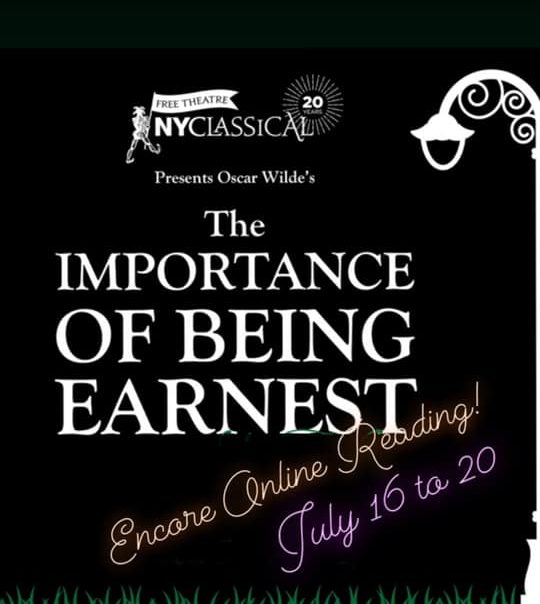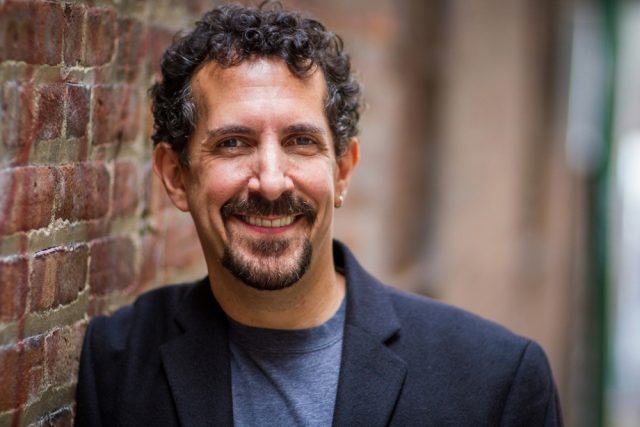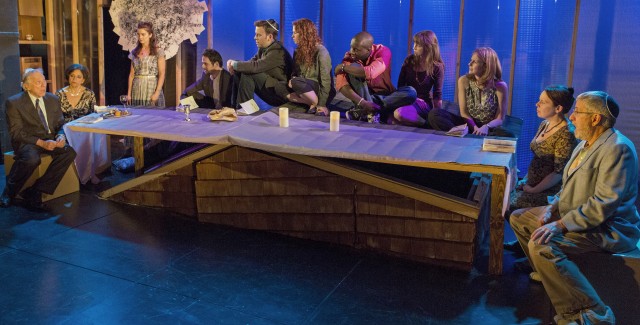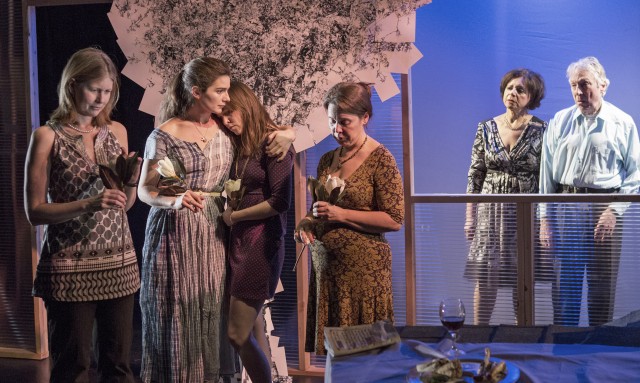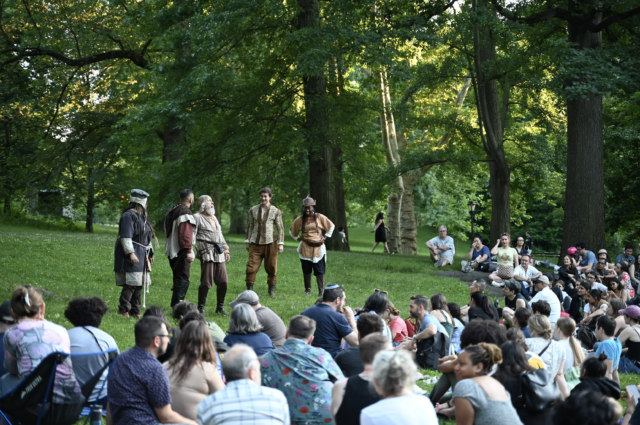
New York Classical Theatre’s Henry IV moves from Central Park to Carl Schurz Park and Castle Clinton this summer (photo © Sarah Antal)
HENRY IV
Through June 30: Central Park, Central Park West & 103rd St.
July 2-7: Carl Schurz Park, East 87th St. & East End Ave.
July 9-14, Castle Clinton, Battery Park
nyclassical.org
New York Classical Theatre is celebrating its twenty-fifth anniversary of presenting free Shakespeare in the parks and other public spaces throughout the city — along with works by Chekhov, Schiller, Shaw, Molière, and more — with another fun and fanciful frolic, a streamlined adaptation of the Bard’s Henry IV. The play, which falls between Richard II and Henry V in the Henriad, just finished its run in Central Park, where the action took place in seven locations around 103rd St. on the West Side, and next moves first to Carl Schurz Park, then to Castle Clinton in Battery Park.
Combining the two parts into one two-hour version, NYCT founding artistic director Stephen Burdman focuses on the relationship between Prince Hal (Ian Antal), who is the son of Henry IV (Nick Salamone), and the jovial bloviator Sir John Falstaff (John Michalski). The king’s reign is being threatened by a group of rebels led by Hotspur (Damian Jermaine Thompson), Northumberland (Juan Luis Acevedo), Countess Worcester (Carine Montbertrand), Countess Mortimer (Anique Clements), Lady Percy (Briana Gibson Reeves), and Welsh rebel Owen Glendower (Ian Gould). Supporting the king are Westmoreland (Gould), Sir Walter Blount (Nuah Ozryel), and, ostensibly, Prince Hal, aka Harry, who is spending all his time carousing with Falstaff and his merry band of drunken thieves: Poins (Anique Clements), Pistol (Ozryel), and Bardolph (Reeves), who hang around the Boar’s Head Tavern run by Mistress Quickly (Montbertrand).
Henry IV, formerly Henry Bolingbroke, usurped the throne from his cousin, Richard II, and now is in a face-off with Harry Percy, called Hotspur, who has defied the king’s orders by taking hostages following a war with the Scots and will only release them if the king pays a ransom to Glendower for Edmund Mortimer, Hotspur’s brother-in-law.
Meanwhile, the rotund braggart Falstaff conspires with Pistol and Bardolph to rob passing strangers, only to then be robbed themselves by the masked Hal and Poins, who have done so just to hear Falstaff regale them with a tale of how he had to fight off a hundred men with his skill and daring. Later, Falstaff embellishes his actions during the Battle of Shrewsbury, as Henry IV attempts to defend the realm against Hotspur and Glendower.
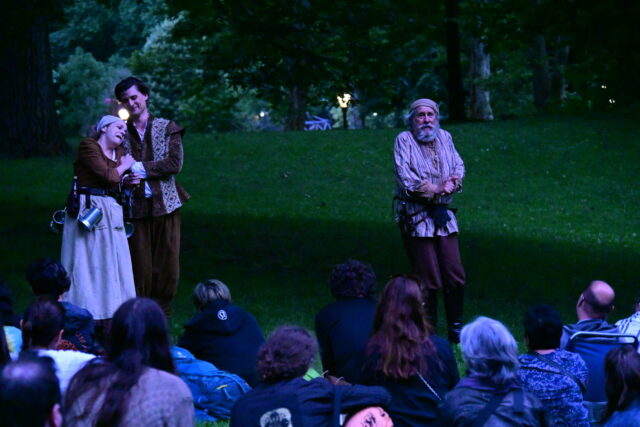
Sir John Falstaff (John Michalski) entertains the audience as well as Mistress Quickly (Montbertrand) and Prince Hal (Ian Antal) in NYCT’s Henry IV in Central Park (photo © Sarah Antal)
Burdman leads the audience through his trademark Panoramic Theatre, combining Environmental Theatre and Promenade Theatre as the crowd follows him and the actors to each new location, picking up passersby along the way as other parkgoers wonder what is going on. Part of the fun is watching this interaction between the actors, the grass and trees, the setting sun, and random strangers.
Production designer Kindall Almond keeps it simple; the period costumes are right on target, and there is no furniture and few props, primarily swords and Mistress Quickly’s utility belt of a bottle and cups. The performers are not mic’d, so the dialogue is front and center. The exchanges between the sly Prince Hal and the bawdy Falstaff lie at the heart of the play:
Prince Hal: Now, Harry, the complaints I hear of thee are grievous.
Falstaff: ’Sblood, my lord, they are false.
Prince Hal: Swearest thou, ungracious boy? Henceforth ne’er look on me. There is a devil haunts thee in the likeness of an old fat man. Why dost thou converse with that trunk of humours, that bolting-hutch of beastliness, that swollen parcel of dropsies, that stuffed cloak-bag of guts, that father ruffian?
Falstaff: Whom means your grace?
Prince Hal: That villainous abominable misleader of youth, Falstaff.
Falstaff: My lord, the man I know.
Prince Hal: I know thou dost.
Falstaff: But to say I know more harm in him than in myself were to say more than I know. That he is old — the more the pity. If sack and sugar be a fault, God help the wicked! If to be fat be to be a sin, then many an old host is damned. No, my good lord, banish Pistol, banish Bardolph, banish Poins, but for sweet Jack Falstaff, kind Jack Falstaff, valiant Jack Falstaff, banish not him thy Harry’s company, banish plump Jack and banish all the world.
Prince Hal: I do, I will.
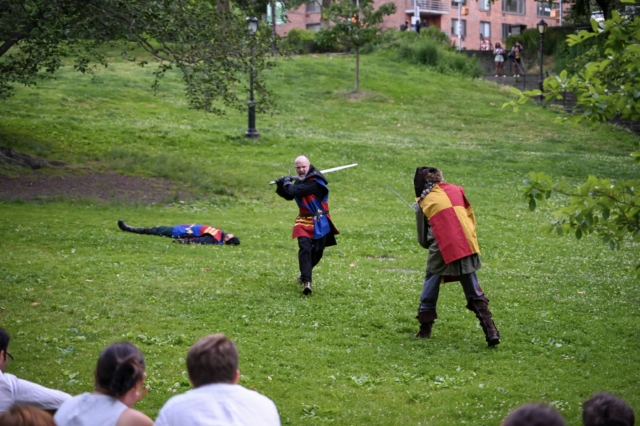
King Henry IV (Nick Salamone) fights off his enemies in swordfight in Central Park (photo © Sarah Antal)
The cast, a mix of NYCT veterans and first-timers, is solid up and down; six actors play two roles apiece, while three actors remain in one role: Salamone is a worthy King Henry IV, Antal makes a fine Prince Hal, but Michalski steals the show, as he should, as Falstaff, a meaty, mighty character made famous by Orson Welles in the 1965 film Chimes at Midnight. In his thirteenth NYCT show, Michalski, who has previously played Lady Bracknell, Prospero, Scrooge, and Sir Toby Belch for the troupe, immediately connects with the audience, making sure we never leave his (portly) side. His bellowing voice and unyielding demeanor are intoxicating, both hilarious and sad, as Falstaff stumbles across the hilly grass and embellishes his endless tales with a bold effrontery. “There lives not three good men unhanged in England and one of them is fat and grows old,” he declares.
Later, marching through the middle of the crowd, Michalski/Falstaff murmurs, “Where did all these people come from?” Burdman expects upwards of 7500 people to experience his superb adaptation this summer; you should do your best to be one of them.
[Mark Rifkin is a Brooklyn-born, Manhattan-based writer and editor; you can follow him on Substack here.]
